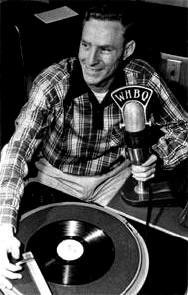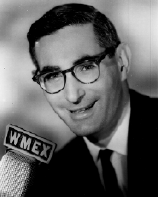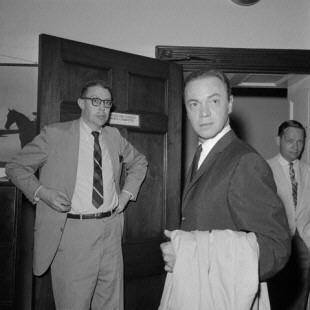
Dewey Phillips
Payola and the Disk Jockeys
Payola could be pay for play, personal gifts, writer credits, distributors set up with free records; artists at no costs for dances and concerts, BMI's paying royalties against future earnings to help start new publishers and build its membership depicted an overt attempt to bribe performers and disk jockeys. the monies used were repaid future earnings therefore mounted to the beneficiaries as loans to themselves.. more serious were the under-the-table deals violating ethics governing competition.
Payola was an open secret the only disagreement was about it's range and significance disc jockeys denied taking it . payola could wreck a career because popularity depended on giving the public what it wanted. billboard wrote the DJ who lets his interest lapse is in danger of having the field pas him by. he will be outpaced by more alert DJs who are quicker to sense the public's music taste and are hip to the developing music patterns."
By the 50s influential disc jockeys were receiving hundreds of records to listen to every month and payola was a good way to get their attention. For the independents with small marketing budgets it was often the only way to promote rhythm and blues and rock 'n' roll records. Some had flat rate deals of $50-$100 a record Others negotiated a percentage of sales
Disk jockeys were a major part of this changing environment. With local focus and generally unfettered network control, they catered to a variety of local tastes. Knowledgeable disc jockeys were effective salesman of the music, providing information about the performers and songs, boosting their credibility and generating intense loyalty. That made them as much of the program as the music they played. Their rapport with the audience also made them effective salesmen for their sponsors products.

Dewey Phillips
Most powerful were those independent of the networks because they were sensitive to local trends, catering exclusively to an audience they knew and understood in terms of the music wanted played. This would aid in the rise of rock and roll as a rapport developed between jocks and listeners that crossed racial and generational lines. Many jocks chose material they could experiment with or personally liked. Dewey Phillips was a good example.
Many disk jockeys supplemented their income by promoting and hosting local concerts and dances that they promoted on their shows. They developed ties to industry insiders by promoting certain records or artists, making it possible for them to attract big name headliners to local stage, solidifying their reputation in the community.
Disc jockeys altered the way hits were made and undermined those that had previously controlled the process. Jocks were in a unique position to exploit their influence lowered quality of records. Next was the looking into where the money was coming from one company after another owned up to "borrowing money from royalties owed to artists to pay disk jockeys. Many station owners would sacrificed their disc jockeys to ensure licenses would be renewed. others used the scandal to settle scores, clean house or reduce expenses.
Many station owners sacrificed their disc jockeys to ensured their licenses would be renewed. Others took advantage of the scandal to settle scores, clean house or reduce expenses. One of the first was Tom Clay of WJBK in Detroit. Clay's yearly salary was $8,000 when approached by record distributors "I never told a person he had to pay me to get records played. they asked me to take money. Were they wrong or good business men?" Hogan claimed that payola had been taken for over a decade In eighteen months Clay took $5000-$6000. The manager in August 1959 learned Clay took payola, warned him but took no action. Later Clay was fired and the station manager let go.
Caught in the middle of this battle which included various lawsuits, were the disk jockeys that played R&B and rock and roll. It was general knowledge in the music business, especially before they were given more rigid playlists were open to payola since it was known as a legal

Tom Clay
Some stations lost disk jockeys. One of the first to go was Tom Clay of WBJK in Detroit on November, 1959 when he admitted to taking payola. Clay recounted that in his first six months in Detroit he never accepted money. "Then my ratings became #1 and offers came in". Tom Clay admitted he received $6000 to plug records

Arnie Ginsberg
Arnie Ginsburg admitted to receiving $4,400 in "goodwill" money from distributors over 2 1/2 years.
|
|
Detroit WJBK disk jockey Don McLeod resigned for undisclosed reasons and Dale Young host of WJBK-TV's Detroit Bandstand WIBG's sister station was let go.
|
i |
|
|
|
Joe Niagara at WBIG in Philadelphia resigned after meeting with station management. Mickey Shorr at WXYZ, who allegedly took a $2000 loan from the Royaltones a local group, was fired. Stan Richards, Bill Marlowe and Joe Smith, three disc jockeys at WILD in Boston were fired.
|
|
Art Ford of WNEW in New York supported the establishment of a policing board composed of disc jockeys and distributors to "weed out the black sheep" Bill Randle in Cleveland believed payola was a multi-million dollar business but didn't condemn deejays. Randle did claim that payola was neither more pervasive nor more dangerous than similar practices in other areas.
It's axiomatic in the music business that a bad song couldn't be made a hit, no matter how much it was plugged, but a good song needed extensive airplay to achieve its hit potential.
|
|
|
The committee decided to look into deejays who took gifts from record companies in return for playing their records on their shows. Fearing the worse the record companies began stepping forward and announcing that they had given money to specific deejays. Soon twenty five deejays and program directors were caught in the scandal. Among the more popular ones were Joe Niagara (WIBG, Philadelphia), Tom Clay (WJBK, Detroit), Murray "The K" Kaufman (WINS, New York) and Stan Richards (WILD, Boston) The probe quickly focused in on the two top deejays in the country, Dick Clark and Alan Freed. Freed's broadcast alliances quickly deserted him. In late November, Freed was fired from both ABC-radio and WNEW-TV.
Clark, with more to lose, quickly gave up all his musical interests when ordered to do so by ABC-TV. When asked to sign a statement denying involvement Freed refuse and was promptly fired from his job with WINS.
|
|
When Clark appeared to testify he brought Bernard Goldsmith a statistician. Goldsmith told the committee that Clark had a 27% interest in records played in the past 28 months and those records had a 23% popularity rating. The committee was stunned as they wondered what came first the chicken or the egg.
Clark's testimony began with telling the committee he had given up all outside interests connected with the recording industry. He also said the only reason he had gotten involved with those businesses were for the tax advantages. Clark admitted a $125 investment in Jamie Records returned a profit of $11,900 and of the 163 songs he had rights to143 were given to him.
When questioned about Jamie records it was discovered that Jamie paid out $15,000 in payola, but Clark denied ever accepting any. The committee clearly didn't believe Clark, but he received just a slap on the wrist. In fact, committee chairman Oren Harris called Clark "a fine young man."

Alan Freed waiting to testify
Freed who refused to deny involvement wasn't so lucky as lucky as Clark. Though he would only receive a small fine and six months suspended sentence his career was in tatters. Freed would die penniless, a bitter broken man, Jan 20, 1965 in Palm Springs, California. He was forty three
None of the disk jockeys that testified were arrested
The result was no immediate action but instead the committee called on the Department of Justice to determine if anti-trust laws had been broken with was endorsed by ASCAP and BMI. Despite lack of action disk jockeys remained the focal point of the continuing attacks on rock and roll.
To limit payola and reduce the power of disc jockeys many stations adopted the Top Forty format.